#this is more brazilian than soccer and samba
Text










#cultura brasileira#film photography#35mm#cidade#photographers on tumblr#brazilingram#35mm film#this is more brazilian than soccer and samba#brasil#br#br tag#tumblr br#tumblr brasil#brazilian artists#brazilian beauty#35mm br#35mm brasil#muito br#br posting#pt br#pt br users#pt brick#artists on tumblr#film grain#analog#fotografia analogica#analogic photography#filmisnotdead#filmcamera#35mmfilm
8 notes
·
View notes
Note
He there 😊🖤 for the ask game: 4, 5, 20 and 27?
Thank you so much for asking! (I rarely get asks 😂). This is gonna be long because I love talking about my country, Brazil! 🇧🇷
4. favourite dish specific for your country?
My favorite Brazilian dish is a street food called Pastel. It's a fried pastry filled with cheese, chicken meat (or any meat), ham, actually there are various fillings (long list). It isn't healthy but Pastel is my comfort food and I use to cope with bad feelings 🥺, if I had a bad I just eat pastel to feel better 🤣. My favorite are cheese, and ham with cheese. I have pics, here. Cheese with ham:


5. favourite song in your native language?
You I'm not the biggest fan of my country's music but there are 3 I really like, my favorites: Velha Infância by Tribalistas, Mina do Condomínio by Seu Jorge, and Paraíso proibido by Strike. The first is a love song, it's one of the sweetest songs I know, the lyrics, melody and instrumental, everything about this song is beautiful ✨.
Mina do Condomínio is samba, when I listen to this one I feel like "Damn! I feel so brazilian right now! 😎🇧🇷" because the sonority of this song screams Brazil! In the lyrics Seu Jorge sings about a girl he's into and how she is always ignoring him (poor guy). But still it isn't a sad song, it's actually pretty fun!
The last is one of my favorites from brazilian 2000s rock
(sorry about putting 3 songs, I couldn't choose one)
20. which sport is The Sport in your country?
Soccer!! No doubt, Brazil is even referred as "the country of soccer" because it is part of the country's national identity so here it's more than a sport, it's culture. Soccer isn't my favorite sport (I prefer Volleyball), I only care about it when it's World Cup. Brazil has won it 5 times so we always get excited expecting for the 6th. World Cup in Brazil is too cool because it lights up a spirit of joy, no matter if you're a fan of soccer or not, everybody feels it. There are people in the colors of our flag 🇧🇷, the green and yellow decorations in a lot of places, it's really cool.
It seems brazilians kinda of lost their hopes after that match in 2014 against Germany, that 7x1. But it happened almost 10 years ago! I remember it was frustrating at first but then I was just laughing at the whole situation with my stepdad's family 😂, didn't take it seriously.
In the last world cup I was reeeeaaally expecting a match with Argentine, our old rival on soccer. This almost happened but Brazil lost to Croatia when the match was about to end (like 4 minutes 💀)

(even this brazilian dog got that world cup spirit lol 🤣🤣🤣)
27. favourite national celebrity?
I had never stopped to think about it 🤔, but the first person that came to mind was Karen Jonz. She is a skateboarder and narrated the 2021 Olympics in women's skateboarding. I find her pretty funny, cool, stylish and young at heart. I like seeing her stories on Instagram, I never get bored watching her talk about random things. I also like how she is not a regular mom, she is a cool mom 😎 (got the Mean girls reference? 😂). Karen is married to a frontman of a rock band called, they're a really cute couple. She's been making her own music but I haven't heard to her songs properly yet.


(In the first pic she's holding my beloved pastel ❤️)
Thank you again for asking! I had fun answering ✨
#ask#no resentments for the 7x1 germans you guys really deserved winning#my phone's battery is low so I'm going answer the other ask later#brasil#brazil
0 notes
Photo


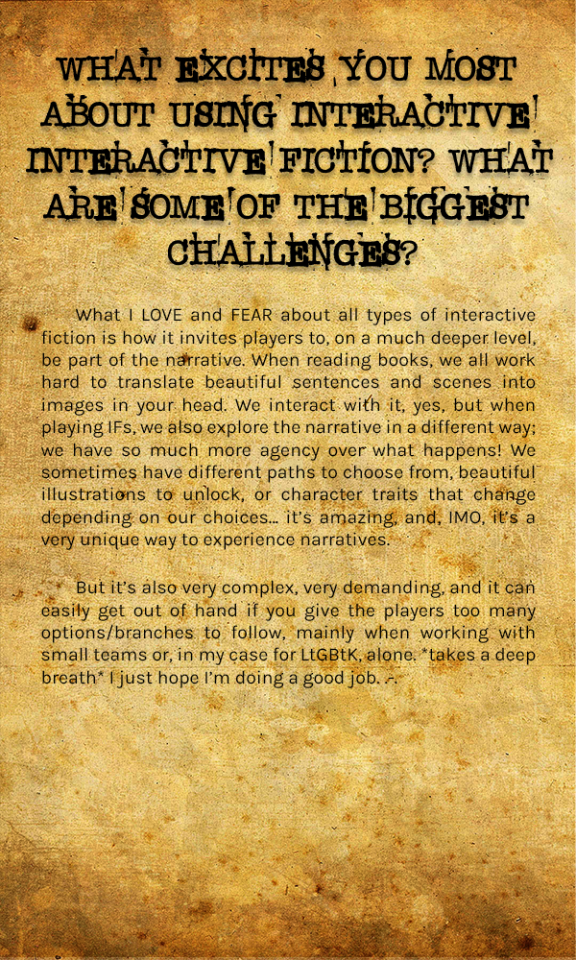
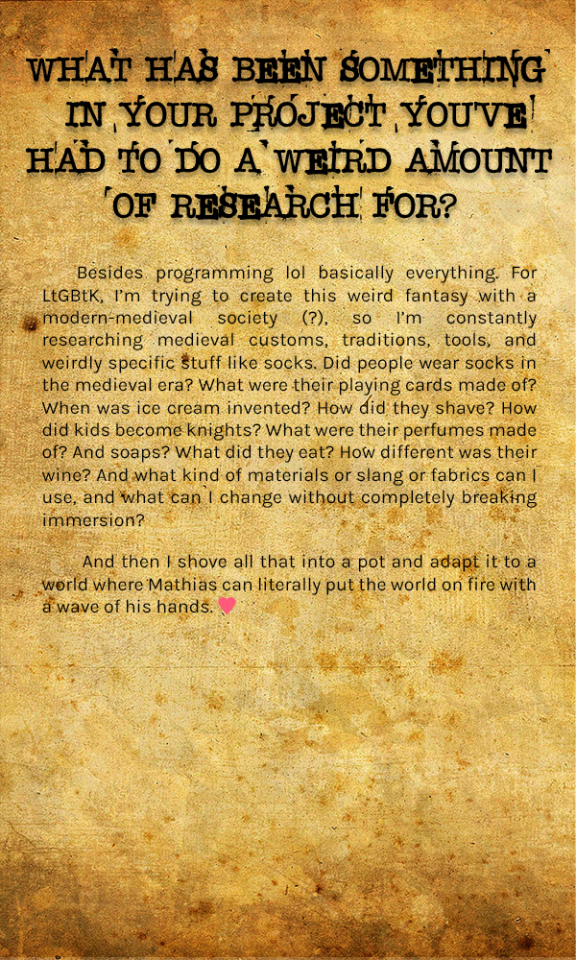

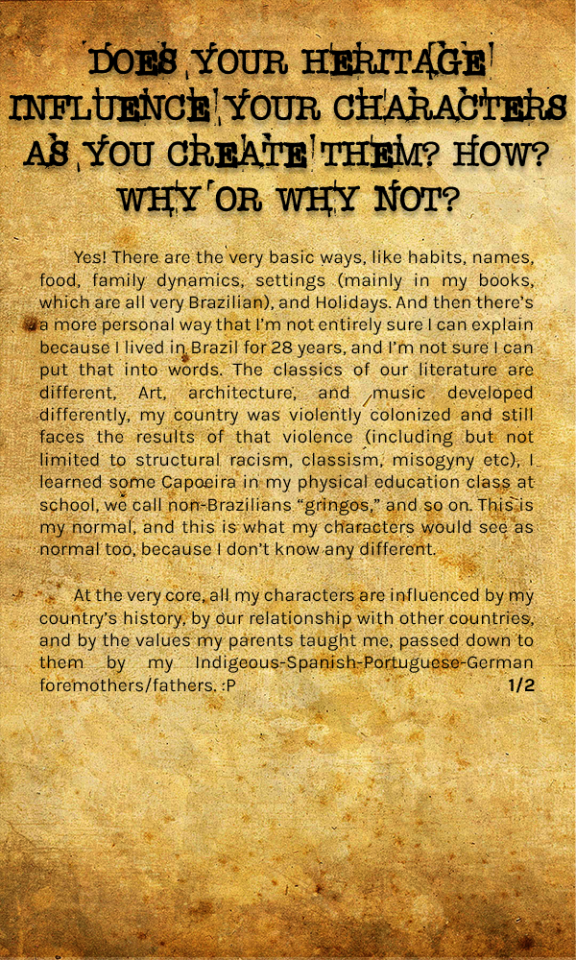



Day 5 of the interviews! let’s give it up for Ligia! :chinhands:
Ligia, author of Love the Guard, Be the King
Latino Heritage Month Featured Author
Mathias' heart has been bleeding since his father, the former King, decided to punish you for his mistakes. As the youngest child of a lesser bourgeois, you were raised in the castle, between the King’s cruelty, the Queen’s friendship, and Mathias’s kindness (or supposed kindness?).
Now, more than twenty Carnivals since your arrival, the King is dead and the Queen’s sickness worsens each day. As the azure taint spreads in the kingdom and the Opalean Wars come to an end, it’s Mathias’s time to sit on the throne.
Will the docile Prince become a kind King, a violent Monarch, or a ruthless Tyrant? Will you have any say in it? And how much will your relationship change?
Love the Guard, Be the King Demo | Author’s Kofi | Read more [here]
Tags: historical, romance
(INTERVIEW TRANSCRIPT UNDER THE CUT)
Q1: So, tell us a little bit about the projects you’re working on!
With pleasure! Right now, I’m working on three main projects. My personal Visual Novel project, “Love the Guard, Be the King,” a second Visual Novel I’ve been secretly working on with a good friend for the past 10 months or so, and I also have an ongoing book series about hot, quirky supervillains—but I’ll focus only on the first two cause that’s what we’re here for, right? Hahaha.
LtGBtK is a really intimist experience, focused more on the MC’s and RO’s character arcs and how we can change depending on our experiences and how we feel about them. The entire plot happens in only four days, but it takes into account almost 30 years of history—basically Mathias’s (the only RO) entire life!
“Crystal Library” has mystery, romance, magic, 6 ROs, and a ton of memorable scenes already. I’m working on the graphics and the programming for this one, while Coco Nichole (@dreamybard), one of my favorite writers ever, is the brilliant mind behind the plot and all of CL’s characters! I can’t wait to share this one with you all. Romance is optional in both. :)
Q2: What excites you most about using interactive fiction? What are some of the biggest challenges?
What I LOVE and FEAR about all types of interactive fiction is how it invites players to, on a much deeper level, be part of the narrative. When reading books, we all work hard to translate beautiful sentences and scenes into images in your head. We interact with it, yes, but when playing IFs, we also explore the narrative in a different way; we have so much more agency over what happens! We sometimes have different paths to choose from, beautiful illustrations to unlock, or character traits that change depending on our choices… it’s amazing, and, IMO, it’s a very unique way to experience narratives.
But it’s also very complex, very demanding, and it can easily get out of hand if you give the players too many options/branches to follow, mainly when working with small teams or, in my case for LtGBtK, alone. *takes a deep breath* I just hope I’m doing a good job. .-.
Q3: What has been something in your project you’ve had to do a weird amount of research for?
Besides programming lol basically everything. For LtGBtK, I’m trying to create this weird fantasy with a modern-medieval society (?), so I’m constantly researching medieval customs, traditions, tools, and weirdly specific stuff like socks. Did people wear socks in the medieval era? What were their playing cards made of? When was ice cream invented? How did they shave? How did kids become knights? What were their perfumes made of? And soaps? What did they eat? How different was their wine? And what kind of materials or slang or fabrics can I use, and what can I change without completely breaking immersion?
And then I shove all that into a pot and adapt it to a world where Mathias can literally put the world on fire with a wave of his hands. ♥
Q4: Which of your characters is most like you? How?
I think I’m a mix of them all, but mainly Mandra and Rafa (one of my main characters in my supervillain books). They have wildly different personalities and stories, but those two have clear views of the kind of person they want to be, they’re not afraid of their soft sides, and they are ready to work hard to become good at what they love. Rafa has a specially strong connection to her brother, like my siblings and I, and Mand is often locked in an eternal state of wanting to be alone and wanting to be surrounded by family/loved ones, so I guess we meet there too!
Q5: Does your heritage influence your characters as you create them? (How? Why or why not?)
Yes! There are the very basic ways, like habits, names, food, family dynamics, settings (mainly in my books, which are all very Brazilian), and Holidays. And then there’s a more personal way that I’m not entirely sure I can explain because I lived in Brazil for 28 years, and I’m not sure I can put that into words. The classics of our literature are different, Art, architecture, and music developed differently, my country was violently colonized and still faces the results of that violence (including but not limited to structural racism, classism, misogyny etc), I learned some Capoeira in my physical education class at school, we call non-Brazilians “gringos,” and so on. This is my normal, and this is what my characters would see as normal too, because I don’t know any different.
At the very core, all my characters are influenced by my country’s history, by our relationship with other countries, and by the values my parents taught me, passed down to them by my Indigeous-Spanish-Portuguese-German foremothers/fathers. :P
The main, more palpable way my heritage influences my characters, though, is through humor and theme. I think Brazilians have a very specific, sharp, and often very smart kind of humor that, IMO, stems from the type of history our country has, and the way we look at life, sometimes translating pain into humor. As for themes, I usually write about what makes me angry... and there’s a lot in Brazil’s history and modern society that causes me that. :)
But all I know for sure is that I want to show the world Brazilians are much more than samba and soccer.
Q6: What is something you love to see in interactive fiction?
Other people! In the same way I add my history and worldview to my creations, I always approach stories thinking that there’s a whole, well, history behind them. And I love that! Also, I adore choices that feel impactful + good friendships and family relationships + soft romances with mutual respect. ♥
Q7: Any advice to give?
Hmm. Be proud and celebrate who you are and where you’re from. Learning and understanding the world inside us is a life-long process, so it’s always a victory to discover new pieces of ourselves. :) Also, if you can, talk to people that come from different cultures than yours to expand your worldview, don’t be afraid to be soft (the world needs more kindness), and please study personal finance. Seriously. XD
#if: events#latino heritage month#latino authors#cyoa#choose your own adventure#choose your story#interactive fiction
117 notes
·
View notes
Text
Letter to José
José when you receive this letter without reason, you'll know it was all over between us.
Fandom: The Three Caballeros
Relationship: José/Panchito
Notes: Hi everyone! I just wanna to tell that I have made my first Panjose fanfic! (Well it is a songifc :b) and although it's on ao3 I want to share it here too! Hope you like it!! ^^. The song with which I was based to make this songfic is called " Carta a Eufemia" and it is interpreted by Pedro Infante, I’ll leave you the song at the end!
Two years had already passed since the filming of the three caballeros and with it two years of courtship between the Brazilian parrot and the Mexican rooster, making family and friends more than happy for the couple; in Brazil because it is the couple with whom the green feathers lasted the longest (not counting the beautiful Rosinha Vaz, but that is another story because between the two there is a relationship that consists of breaking up and returning, well, rather it existed until the mexican arrived) And in Mexico they were happy because the rooster had finally decided to choose a partner, only there was some disappointment, anger and even lawsuits with his father when he found out that the happy couple was a man and not a woman, but that is also another story. The point here is that although some did not want to admit it, they were all happy for the relationship that these two birds had.
If you ask Panchito how is his luck with women, he would say that it is very good since in his town there are several women who are interested in him, but if you ask him how is his luck in love, surely he would laugh and say that love was not made for him because no one has ever stolen sighs and sleepless nights thinking of that special person, until he met José.
For Panchito, dealing with José was like a soccer match where you begin observing calmly and as the game progresses it comes the insults, fouls and yellow cards; so yes, when Panchito and José met they did not have a good relationship, but the second half arrived and with it an adrenaline, emotion and a feeling of not wanting to change the channel, until the first goal arrives, making that the team who scored the goal began to scream with euphoria and happiness while the opposing team begins to get frustrated and that's how Panchito's mind was when he first questioned what he was beginning to feel for the samba dancer. And suddenly more goals arrive making more visible who could be the winning team, until a penalty arrives a night before the premier of his film in which the entire stadium fell into deathly silence because that goal is the one that would mark the victory or the defeat, and there we see the player kick the ball and how it approaches to the goal, mocking the goalkeeper who had to jump to stop the ball but still being insufficient because the one who stopped that ball was the net, causing the entire stadium to rise up screaming with excitement and happiness as they finally saw the beaks of the two birds joined in a kiss, thus marking the end of the game and the start of a relationship.
After that night for Panchito it was like being drugged, he felt in the clouds every time he looked at his partner and when he surprisingly kissed him it was as if a gravitational force was dragging him strongly to the floor, and he loved that change of emotions that the brazilian provoked in him. What he did not love was the decision to have a long distance relationship, but he had to reluctantly accept because in Mexico his family needed him and in Brazil they needed José, so with the promise that the two would constantly send letters, they said goodbye.
And now after almost a year of living in different countries we can see a well-dressed rooster as a charro signing the end of a paper "Done!" He exclaimed appreciating the final product "Here you have" he said handing the letter to his brother Miguel "Read the letter that I am going to send to the José of my life, to see if he answers it to me" Miguel took the letter between his hands and began to read it.
José, cuando recibas esta carta sin razón.
[José, when you recieve this letter without reason]
"You are sure about this?" Miguel ask looking at Panchito disbelief.
"Of course"
Ya sabrás que entre nosotros todo terminó
[You'll know it was all over between us]
"Won't he take it wrong? I mean, this is said to the face" Panchito gave a few laughs as he shook his head.
"Miguel, Why am I going to fly to Brazil to just tell him we're done?" Panchito ask.
"I don't know, maybe for dignity? Honor? Or even so that he doesn't TAKE IT WRONG!?" Remarking the last words, Miguel insisted as if it were the most obvious thing.
Y no la des en recibida por traición.
Te devuelvo tu palabra, te la devuelvo sin usarla y que conste que en esta carta que acabamos de un jalón.
[When you receive it, don't take it as betrayal
I send back your word, I send it back without using it, and I warn you, in this letter that we finish just like that]
Panchito leaned his back on the chair while crossing his arms and replaid "Dignity? Honor? That he doesn't take it wrong? Ay no inventes, better you keep reading the letter and I assure you that you will change your mind" his brother just rolled his eyes and kept reading.
No me escribiste, y mis cartas anteriores no se si las recibiste.
Tu me olvidaste y mataron mis amores el silencio que les diste.
[You didn't write me, and my previous letters I don't know if you received them.
You forgot me, and my love was killed by the silence that you gave me.]
"Don't you think you are exaggerating?" Miguel asked again taking a sip of his drink .
"Oh que la, si no es Chana es Juana" he claimed and running his hands over his crest he let out a frustrated sigh "look, everything that is in the letter is the truth and what I truly feel. Although I continue to have unconditional affection for José, this can no longer continue like this, he is there and I am here and thanks to the distance this relationship has become non-existent, I even forgot how to love him!" he explained.
¡A ver si a esta si le das contestación José!
Pues del amor ¿pa' que te escribo? y aquí queda como amigo
Tu afectísimo y atento y muy seguro servidor
[I'll see if to this letter you gives a reply José!
About love, what could I tell you? And here remains as a friend
Your most affectionate, attentive and very secure server]
"Pancito Pistoles" he read the signature aloud and left the letter on the table "Well there as you see, if you are sure then send it to him" He sighed pulling out his wallet and putting a few bills on the table.
"Pues ya está" Panchito got up from the table next to his brother "come with me to send it" he hugged his brother by the shoulders and the two of them left the restaurant.
-------
The afternoon was setting on the beautiful coasts of Rio de Janeiro reflecting the pink and orange tones of the sky in the sea.
"Zé, you have received a letter" said his friend Nestor entering to the balcony where the parrot was admiring the peaceful landscape while smoking one of his cigars.
José, cuando recibas esta carta sin razón
Ya sabrás que entre nosotros todo término
[José, when you receive this letter without reason
You'll know it was all over between us]
"Muito obrigado" he answered taking the letter in his hands and without waiting, he opened it, he already knew who it was and was eager to read what the mexican would tell him now. Would he tell him that he finally bought Mr. Martinez a new saddle? Or maybe he would tell him how he reluctantly pulled his brother out of a fight again?
When he unfolded the paper and read the first sentences, his brow began to furrow and a void seized him.
No la des en recibida por traición.
Te devulevo tu palabra, te la devuevo sin usarla y que conste en esta carta que acabamos de un jalón.
[When you receive it, don't take it as a betrayal.
I send back you word, I send it back without using it, and I warn you in this letter that we finish just like that]
He entered to his room in dismay and he dropped into the chair at the small desk he had.
No me escribiste, y mis cartas anteriores no se si las recibiste
[You didn't write me, andmy previous letters I don't know if you received them]
His gaze immediately traveled to his desk, which was littered with crumpled sheets of paper scattered everywhere, some on the floor, others in the trash can, and many others on top of the same desk, but there was a place where it wasn't littered with trash. and that was where he kept all the letters he received from Panchito, each one of them was ordered and well arranged by date.
Tu me olvidaste, y mataron mis amores el silencio que les diste
[You forgot me, and mt love was killed by the silence that you gave me]
The anxiety was consuming the poor brazilian who did not realize he was puffing on his cigar too fast until the ashes of the cigar fell into his sack. He put the letter aside and putting out ths cigar into ths ashtray he tried to clean the ashes from his sack, when he finally thought his sack was clean he rubbed his eyes and took the letter again.
¡A ver si a esta si le das contestación José!
[I'll see if to this letter you gives a reply José!]
José squeezed his beak, he knew that there would come a time when Panchito would get tired of not having any information about him, but he never imagined that those lines would cause much impact on him, because just seeing that that sentence was with an exclamation point and that his name was included he imagined as if the rooster was giving a cry of despair and help to know about him. And it is not that José did not want to respond and escape from that relationship, on the contrary, he loves Panchito with all his being and with each letter he received his love for him increased more, only that whenever he was about to write he could not find the words correct and more when everything around him started to go from bad to worse, Zico and Zeca arrived (his nephews whom he loves very much) but unfortunately his sister left, may he rest, the bar where he worked was closed and the money began to scarce and it was in those moments that the only thing that kept him standing were the letters he received from Panchito.
Sometimes it crossed to his mind that he could ask for help from the mexican, but immediately the shame consumed him, then he thought he could start sending letters and after sending some now he could ask for help, but he thought he would look very cheeky and better he didn't sent anything, and now that his life is stable again he does not know what to say, keeping only erasers scattered all over his desk and floor.
Del amor ¿Pa' que te escribo? y aquí queda como amigo
Tu afectísimo y atento y muy seguro servidor
[About love, what could I tell you? And here remainss as a friend
Your most affectionate, attentive, and very secure server]
"Signature Panchito Pistoles" he threw the letter on the table and leaned back in his chair "it's all over" he sighed heavily, although now he wanted to and tried to write him a letter to explain everything, to tell him to wait that he still loves him, that he had not forgotten him and that he was not going to let their relationship end in this way, he did not feel up to it and above all he felt defeated and tired.
He took out a cigar and lit it, letting himself be carried away by the smoke it gave off and his pain until someone entered to his room. "Zé, another letter just arrived." His friend Nestor's voice was heard, but he did not respond and did not even I turn to see, he just sat there smoking his cigar "I'll leave it in bed for you" answered the other walking around the room and when he left the letter he left, leaving José in complete silence immersed in his thoughts.
After several minutes he got up to go get the letter and turn on the light since the darkness of the night had already flooded the room.
Seeing where the happy letter came from, he threw it angrily "o que aquele pedaço de mariachi quer ?! Não é o suficiente para ele quebrar meu coração !? Agora ele precisa tirar sarro de mim, ou talvez..." letter on the floor with hopes and something in it begged that in that letter it would come out that it was all a joke in bad taste or even a warning for not keeping his promise.
With fear he picked up the letter and stopped looking at the details of the envelope, it was strange that the letter was different from the one already known but it could be clearly seen that the sender's address said Hacienda Quintero, he opened the envelope and slowly took out the paper that was inside.
Hi José,
I hope you are well and I hope you will forgive the informality of this letter.
I know what my brother wrote in his letter and I want you to know that I do not agree with the decision he made, well first of all I hope you have already read the letter, if not, everything that comes here will not make sense.
I want you to know that my brother still loves you well, but that does not remove the fact that he is hurt because he thinks you have forgotten him and now he has taken a very proud, very arrogant attitude and God! Not even a day has passed and I can't stand it anymore. So, Mr. Carioca, I kindly ask you if you don't want to send a letter, then at least come to fix my brother and even though I haven't seen you in a long time, I know that you still love my brother.
There I leave you a few Mexican bills (sorry I did this letter suddenly and I didn't have time to look for Brazilian reals) with which you can go to Mexico or you can keep them and do whatever you want with them, consider it as a gift and an apology for the letter from my silly brother.
I am saying goodbye because Panchito is here and he does not know that I have written this letter and I do not want him to find out that he exists.
Miguel Quintero.
He opened his eyes surprisingly, he did not know what impacted him more, the fact that Panchito's brother was playing the cupid, knowing that Panchito still loved him or that José received a second chance.
He checked the envelope again and, indeed, Miguel had given him several bills with which he could pay the last debts he had left or he could go to Mexico to try to win back the love of his life.
He sat slowly on the bed thinking what he would say to Panchito when he see him. Perhaps he would claim the fact that he cut him by letter and did not have the decency to tell him in front, because this things you need to said it to the face.
End Notes:
"Oh que la, si no es Chana es Juana"-- oh what the, if it's not Chana it's Juana. (In Mexico the phrase "if it's not Chana it's Juana" is a colloquial saying that express if it's not one thing it's the other)
"Pues ya está"-- Well that's it
"Muito obrigado"-- thanks a lot.
"o que aquele pedaço de mariachi quer ?! Não é o suficiente para ele quebrar meu coração !? Agora ele precisa tirar sarro de mim, ou talvez" --what those that piece of mariachi wants?! Isn't it enough for him to break my heart!? Now he need to make fun of me, or maybe...
undefined
youtube
#the three caballeros#panjose#josepan#josé carioca#panchito pistoles#panchito romero miguel junipero francisco quintero gonzalez#songfic#Nestor#Zico and Zeca#rosinha
44 notes
·
View notes
Text
Exclusive post to explain to the gringos how life works here in Brazil, in Latin America. translated into English.
First: We speak Brazilian Portuguese, not Portuguese from Portugal; second, yes, we have indigenous people here, they are normal people like any other, with their own cultures and languages too; third, Brazilians are the most diverse people in the world, because we are a free country and anyone is welcome here, literally almost everyone from other countries is here; fourth and last, not every brazilian likes soccer or knows how to dance samba, it's a very annoying stereotype, avoid asking this kind of question if you find a brazilian out there ok?

1- food and drink: we are known for eating even stones, after all, we are an underdeveloped country, however, the time when it was normal to eat monkey and alligator has passed, that was in the time of mining and rubber plantations, nowadays it is not it's more socially acceptable, only small groups of people still practice it. In general, we eat rice and beans every day, this cannot be missing from our plate. In general, when we give dinners to family and friends, the table is always very generous, with the food of the house and some dish that the guest brings to complement (in a way, here it is disrespectful to go to family dinners or barbecues empty handed, bring some dessert or drink, it will make other people happy, because more food is more joy here).

Meat, a lot of meat, we eat meat like hell, with a lot of salad very seasoned with oil and salt, sometimes we put banana in the food, or chilli pepper, a fried "okra" and a lot of farofa.
Cachaça, we love cachaça and a lot of beer, a lot of beer, and a lot of tobacco too, (obviously not all of them). Caipirinha is one of the most appreciated drinks in all of Brazil, and depending on the cachaça used it can be stronger than normal, the most used cachaças are the "velho barreiro" and the famous "51", I remember the first time I a sip of it, I was 11 years old (here it's normal for kids to try drinks and start drinking from 14 onwards).


2- going out at night and groups of teenagers.
It's dangerous to go out here after ten o'clock, we may be the nicest, most smiling people in the world, but we're also big sons of bitches prepared to kill other people. You can get mugged, and if you annoy the mugger he may stab you or even shoot you. Beware of two guys on a motorcycle, this is not a meme guys, ok, it's a meme yes, but a meme that tells the truth, in general, if two guys on a motorcycle pass you and turn around it's better to run and hide in some thicket , because they will rob you and maybe even beat you in the middle of the street, that's how it works when you leave after ten.


In general, adolescents frequent public squares, public soccer fields, ice cream parlors, centers, skate ramps and sidewalks in front of one of their houses, in general, they drink and smoke marijuana or cigarettes together, but not all adolescents they do that, they all walk up and down around, in groups of more than 5 people, however, not all of these groups are drug users.
3- LGBTQIA+
Everyone here respects this group, some older people don't, and we just ignore them, but when younger people are involved and public aggression, there are always fights between the groups of young people who support and those who are against it, we are one diversified country and therefore the level of prejudice here is high, because the more different people, the more the majority is against the minority.


4- religion
We are very alternative, many believers and evangelicals, spiritualists, Umbanda, atheists and agnostics, indigenous religions, and other smaller religious groups, there are many religions here, except that we also have the religions of other countries, of the immigrants who brought them and has complete freedom to exercise it here, although some Brazilians do not accept this freedom. If you come to Brazil, you will notice that in the neighborhoods and cities there will always be a light blue or white church somewhere, there are at least 15 such churches for each neighborhood, there are many churches.
5- animals and why we live so close to them
So we do live close to them most of the time, but that doesn't mean they come into our house and sleep on our couch. When we go to parks or somewhere that has a lake (here every park has a lake) there will usually be a group of capybaras nearby, eating grass and swimming, herons and other birds like the "quero-quero" or little droves in the water, and one or two alligators floating around. and watching people, they are not dangerous, but when the alligator gets too big, I think IBAMA (Brazilian Institute of Environment and Natural Resources) is called to take it to a reserve or a place that is further away, whether or not it is a wild animal, but the capybaras stay there peacefully and we are in love with them, they are basically a cultural heritage.

6- How is the life of a Brazilian?
We live in shit, but we try to make the most of it and make it worth it, we strive to study and get a good job that helps us to help our family, many of our grandparents are diabetics and sometimes the health plan doesn't help very well (here we have SUS so we don't pay for insulin and others; #vivaosus). Brazilian teenagers most of the time only care about money, not because we are stingy, but because inflation is choking us and if we don't get money, we go hungry, unless you are middle class, middle class people worry about the money to keep the house, because the bills also suck everything we earn from hard work.
We love to have a barbecue with family and friends, lots of sausage, beef and chicken, all roasted and dripping with fat, we eat with freshly made vinaigrette, farofa and rice, sometimes a baião, lots of beer and soda, sometimes we can even do it on the edge of a river or a pool to make it cooler. It's ok for vegetarians, we put vegetables on the grill and they bring their own food with them, without prejudice, although the grill doesn't go well with this idea sometimes, we also love having an açaí, depending on the region of the country people eat with farinha de puba, powdered milk, condensed milk, banana, chocolate and even with fried fish, very good. Here anything good is synonymous with a party, anything at all, once, we had a party in the neighborhood to celebrate the anniversary of a huge crater in the middle of the street.
We usually go to a neighborhood bar, which is a kind of bar with plastic chairs and cheap beer, with pool tables and a lot, but a lot of cigarette smell in the air, I don't go to these places very late at night, that's when the bar closes and sometimes there is a fight with the owner trying to kick out some drunk who doesn't want to leave, other than that it's very cool.

We usually play a lot of ball in the middle of the street, using the Havaianas to score the goal, sometimes the cars pass over it but it's fine, then everyone makes a crowdfunding and buys two liters of coca cola and we sit in the middle wire until nightfall. A nice point is that we are the masters of making protests and marches to get our rights, that's why I said we're nice, but it's not good to mess with us either, but we take everything in the zueria so if they apologize it's okay . It's like they say around here, the best of Brazil is the Brazilian, or maybe it's the worst.
I haven't commented on everything about Brazil, obviously, it's a lot, but this is the basics of the basics.
Until another day, friends.
You can ask questions here if you want, I will answer them all.
2 notes
·
View notes
Text
International Acclaim and Local Criticism of BLACK ORPHEUS By Jessica Pickens

It’s a film that inspired director Bong Joon Ho in his formative years. The Academy Award-winning director of PARASITE (2019) said that seeing BLACK ORPHEUS (’59) when he was in junior high school made a big impression on him. And at the time of its release, BLACK ORPHEUS was met with international enthusiasm. But in Brazil, the response was one of disappointment.
The film is a modern retelling of the Greek mythology story of “Orpheus and Eurydice.” French director Marcel Camus adapted Vinícius de Moraes’s 1956 stage play, Orfeu da Conceição. It was Camus’s breakout film, and also his only hit — making him a one-hit-wonder in the world of filmmaking.
Set during Carnival in Rio de Janeiro, Brazil, Eurydice travels from the country to the city to visit her cousin Serafina. She is running away from a man that stalked her at her farm, and she believes he wants to kill her. In Rio is Orfeo, a streetcar driver, whose girlfriend Mira is eager to get married. Orfeo is reluctant. When Orfeo meets Eurydice, the two fall in love and it’s like they have known each other since the beginning of time. During Carnival, the two dance together but their happiness is short-lived. The man stalking Eurydice has arrived in the city dressed as Death. As they try to escape Death, the couple also has to avoid an outraged Mira.

While in production, the film wasn’t completed. Filming on location in Brazil, Camus had a limited budget and slept on the beach to save money. “[He] lived from meal to meal and worked from reel to reel,” Time Magazine reported in Janury 1960. When he was finally down to $17, the President of Brazil, Juscelino Kubitschek, helped Camus obtain equipment, according to The Foreign Film Renaissance on American Screens, 1946–1973 by Tino Balio.
The unknown director also cast unknown actors, many of them in their first film role:
Breno Mello was cast in the title role of Orfeo after Camus saw him on a beach and offered him the starring role. This was Mello’s first film role and one of six films he starred in between 1959 and 1988. Before turning to acting, Mello was a Brazilian soccer player for Fluminense and Gremio, major professional soccer teams in Brazil.
Marpessa Dawn was cast as Eurydice. Dawn was the only non-Brazilian in the cast. A native of Philadelphia, PA, this was her first leading film role. Though Dawn continued to act until 1995, none of the roles matched the caliber of her starring role in BLACK ORPHEUS.
Lourdes de Oliveira plays the jealous girlfriend of Orfeo, Mira. This was Oliveira’s first film role and only one of two for the Rio de Janeiro native.
Adhemar da Silva acted as Death in his only film appearance. However, sports and Olympic fans may have already known his name. Da Silva competed on the Brazilian team in the 1948, 1952, 1956 and 1960 Olympics. He was a two-time Olympic gold medalist for the triple jump at the 1952 Helsinki and 1956 Melbourne Olympic games.
Léa Garcia played Eurydice’s cousin Serafina in her first film. After BLACK ORPHEUS, Garcia had a more successful acting career than her co-stars and is still acting into 2020.

With a fresh group of local talent and Brazil as the backdrop, BLACK ORPHEUS is visually stunning and told with the aid of swirling, vibrant colors. The costumes and background primarily used bright golds, blues and purples. Much of the film’s color also came from the music composed by Luiz Bonfá and Antonio Carlos Jobim. The score utilized the ossa nova Brazilian style of music. Jobim is considered one of the founders of the style of music, along with guitarist João Gilberto. Literally translated into “new trend” or “new wave,” bossa nova music is a mix of jazz and samba. The music is so important to the feel of the film that it is practically a co-star, and BLACK ORPHEUS helped create an international bossa nova craze.
After its release, BLACK ORPHEUS was honored with the accolades of the Academy Award for Best Foreign Language Film, the Golden Globe for Best Foreign Film and the Palme d’Or, which is the highest recognition at the 1959 Cannes Film Festival. However, many native Brazilians felt that this was just a French film set in Brazil. They felt that it didn’t show the true Brazil, but what a tourist may see. “The film works outside Brazil, for foreigners that do not know Brazil or who only know it superficially,” said literary critic and poet Manuel Bandeira in 1959.

Playwright Vinicius de Moraes criticized the film for straying from his original play. Composers Jobim and Bonfá, who made the bossa nova a trend because of the film, made very little for their work and the royalties went to French producers instead as noted in a Brown University article, “Black Orpheus: An International View of an “Authentic” Brazil.” Brazilians also felt the film stereotyped their culture, making it appear that poor blacks of Brazil only happily sang and danced. Author Ruy Castro criticized this saying, “It’s amazing that people who live in cardboard houses can be so happy.”
Despite criticism from the location in which it was set, the film is still celebrated today. While the film had such a large international audience, it’s a shame that it couldn’t reflect the lifestyle that Brazilians would have liked to see on film.
#black orpheus#Brazil#african diaspora#world cinema#french#Carnival#rio de janeiro#TCM#Turner Classic Movies#Jessica Pickens
257 notes
·
View notes
Note
but also "more than the average american", that can't possibly be true, it's more likely that anon interacts w the average american IRL but w brazilians only online, bc let me tell you the average brazilian doesn't understand half of what we're talking about over here. there's an entire brazilian pop culture for the non english speakers to be engrossed with
I think its because brazilians are more vocal about their passions in general like that’s why “come to brazil” became this meme. It became generalized in the same way soccer/samba/beaches became our “identity” to people who are not from here
12 notes
·
View notes
Photo

As a Brazilian citizen, it upsets me that we're represented in the Disney Universe by the character of José Carioca. He's portrayed as lazy and as a scammer in most of the comics - he even dresses in typical "malandro" attire. And everytime they try to celebrate Brazilian culture, they end up reducing it to the same old "carnaval, samba and soccer" stereotype. We're way more than that! And the fact that he stars in movies with Spanish titles pisses me off. At least his numbers are in Portuguese.
55 notes
·
View notes
Photo

Just Bolt Things! (Trivia)
About his stage name- "Yeah it was because of the super dog movie what's the problem with it? HUH???"
Renan "Chaotic Troll" Kim
Someone please stop him, ah yes, you can't
Wears the weirdest shit- "it's called fashion sweetie look it up-"
The one to reference Brazilian pop culture the most
"Anitta wouldn't treat me like this smh"
"BBB has turned into the only thing in my life apparently-"
Misses his country so much but more for the food than anything
"Korea is cool and all but where's the coxinha-"
Walks in hoodies during summer
“I CAME FROM A 40ºC NORMAL WEATHER LEAVE ME ALONE-”
Stereotypical Brazilian™
"I hate it when people say Brazil is only samba and soccer but at the same time ah yes play some sambinha and give me a soccer ball-"
Likes to walk barefoot in the company building
They tried to put shoes on him once, once.
ITZY fanboy // "Okay but Ryujin step on me-"
Loves dogs, says he's one, a pitbull specifically, more like a husky but he likes pitbulls so-
Overworks himself constantly :(
“If I’m alive then I can keep going :)” says Bolt, going to the hospital for the 5th time for overexhaustion
Wants to get a lot of tattoos
A baker, like- if he wasn’t an idol he’d be a baker he loves to bake for his boyfriend and friends and family and basically anyone that volunteers to try his recipes out
Managed to enlist a year before time so he could debut, he only trained for a few months before Zona $ul’s debut
#bolt.dev#kumokocnet#aeskocnet#peachykocnet#kocsociety#kpop oc#kpop fake idol#fake kpop group#kpop fake group#fake kpop idol#male idol addition#kpop addition#kpop!au#kpop!oc#kpop au#kpop fanfic
21 notes
·
View notes
Note
9 16
hi! again, it was not me who sent this ask
9. which of your neighbouring countries would you like to visit most/know best?
peru!!! i would love to know the incan stuff they have there, cuzco and machu pichu, everything. i would also like to visit argentina and chile (not a shared border but i don't care), the andes, patagonia (a dream)!! i think all south america is a really beautiful place, and i would like to know more of my own country as well as the others!
16. which stereotype about your country you hate the most and which one you somewhat agree with?
can i list the ones i hate?
that we either live in the middle of the amazon or in favelas, and there are monkeys and capybaras everywhere
that we can all samba and play football (soccer)
that we mostly fit in one ethnicity or that someone doesn't "look brazilian"
that we're always happy and up for party
(not stereotypes) that we speak spanish or brazilian and that the capital is either rio or são paulo - it's brasilia, so easy
there's more but i'm tired
one i agree with? hmm maybe that we're clean? yes, we shower everyday and sometimes more than once. we also brush our teeths after lunch (shocker i know). i like to think brazilians are hospitable and welcoming.
1 note
·
View note
Photo

Bora participar?
#coletividade#artebr#35mm brasil#35mmbrasil#brazilingram#bra#35mm#foto analoga#fotografia analogica#this is more brazilian than soccer and samba#queimando filme#filme35mm#derivacartografica#deriva cartografica
1 note
·
View note
Text
I would've loved to see the Xiaolin kiddos sharing their cultures with each other, especially language, food, and holidays. Omi is coded as Chinese (so, I headcanon that his native tongue is Mandarin), but we know that Raimundo, Kimiko, and Clay are Brazilian, Japanese, and American respectively. I headcanon that they're all bilingual, since they all live at the Xiaolin Temple in China, and every thing we've seen written in the scrolls is written in Chinese, which they can read. So, they can speak their native languages, English, and Mandarin. (What exceptionally talented children Master Fung chose to be his students, lol).
They've already experienced Clay's life, a little, when they went back to Texas with him. They woke up at the crack of dawn, herded and roped cattle, Omi milked a cow for the first time ever, etc. It's canon that Clay loves to eat and is skilled in a number of things: wrestling, lassoing, trick roping, whittling, horse and bull riding, guitar, and square dancing. Since he loves to eat, I imagine he loves to cook too. Barbecue is a big part of Texas cuisine, so there's no reason why he wouldn't fire up a grill for steaks, burgers, and hotdogs if given the opportunity. The monks spend every Christmas with Clay's family, more so because they aren't worked to the bone from dusk til dawn.
Moving on to Raimundo: it's canon that he loves to surf, play soccer, and that he knows capoeira. It was mentioned in one episode (when they were all bickering with each other in Ep. 11 - Royal Rumble) that Clay doesn't understand a lick of the music that Rai listens to (and why would you Clay, when it's Portuguese, lol). Rai would most certainly be open to introducing Clay to Brazilian music. I headcanon that he knows how to dance the samba, and would definitely try to teach it to his friends, wherein embarrassment and hilarity would ensue, and that he practices capoeira daily to music. Omi doesn't understand it one bit, since he'd think he was dancing, and Raimundo would have to explain to him, multiple times, that while it is sorta like dancing, it's also so much more than that. (Queue Rai going into the history of capoeira). The closest Omi would get to understanding it is by likening it unto Drunken Fist, particularly because of its constant movement, and Rai would practice it with him, much to Omi's delight. Rai's adamant about them attending Carnival in Rio de Janeiro at least once (and then every time afterwards), since it's a week-long event. He visits home every year during this time, since his family is together, and since he considers the monks apart of his family, they're welcomed too. His family takes a particular liking to Kimiko, much to Rai's dismay (Her fiery spirit would fit right in with the Pedrosa family). When it comes to cuisine, Rai is a pro at Brazilian snacks, since I headcanon that he learned his way around the kitchen by watching his mother and grandmother. He can whip up a mean batch of Pão de Queijo, Coxinha, Frango A Passarinho (Brazilian Chicken Wings), Pastel Frito de Frango (stuffed pastries), etc. Most of it is too spicy for the others, especially the sauces he tells them they must eat with the food or it won't be the same, and the only one who's down for it is Clay, who's philosophy is, "I'll try anythin' once." He loves it.
Kimiko probably has the grandest of times introducing them to her culture. They've already been to Tokyo, but they only went for Shen Gong Wu, so they didn't really get to experience it the way they wanted to. Kimiko makes it a point to bring them back, so they can really get a taste for Japanese culture outside of Goo Zombies. There's more festivals than Kimiko can name, but among them are some of her favorites are Hanami, Tanabata, Obon, Golden Week, Sanja Matsuri, and Shogatsu, but the latter is strictly reserved for Chinese New Year, despite not falling in the same period, for Omi's sake. Without a doubt, she takes them to Kinokuniya and introduces them to animanga. Of all the guys, Raimundo takes a liking to it the most. The one holiday that throws them all for a loop is Valentine's Day, particularly Omi and Raimundo, since V-Day isn't really celebrated in Brazil or China. Kimiko's not exactly known for gift-giving outside of Chinese New Year and Christmas, so when the boys suddenly receive chocolates from her, they have these looks on their faces. Like, "What's this for?" or "What did you do to this? This isn't some kinda trick, is it?" She almost doesn't give it to Raimundo because of this, threatening to give his to Jack instead, but he hurriedly apologizes, because it's not everyday a guy receives chocolates (especially from the girl he likes). Omi lights up and Clay is confused. The U.S. celebrates V-Day, though not like this. Usually the guy does things for the girl he likes, particularly if they're a couple, not the other way around. But Kimiko explains to him how Japan celebrates the holiday, the difference between honmei and obligatory chocolates, and how the girl gives honmei (or homemade) chocolates to the guy she likes or obligatory chocolate (in most cases, store-bought) to people she considers her friends. And, if he returns those feelings, he gives the girl a gift on White Day. Omi and Clay thank her and dig in with fervor.
Raimundo being Raimundo, however, asks her which one his is, obligatory or honmei, to which Kimiko flares up, embarrassed and angry, and throws it and yells at him that it's obligatory. What else would it be? Clay just gives him this knowing look, and that embarrasses Rai more than Kimiko's reaction. (Why, you're about as transparent as a glass 'a water, Rai). Omi doesn't pick up on it, since he's thinking it's Rai just being Rai. That and he's more focused on the fact that he received chocolate.
Omi relishes in all of it, honestly. Being an orphan and being raised in a Xiaolin temple where all he did was train, he didn't really know too much about the outside world. Plus, he's the youngest of the group. Besides Chinese New Year, in which he received gifts from Dojo and Master Fung, he really didn't have much to look forward to. But, now he does, especially since he has such an amazing family in the other monks, including Jermaine. (Seriously, yall, his expression at the end of Omi Town, when the others gave him gifts and called him their family was way too sweet for words). Whether Omi knows it or not, he's a Pedrosa-Tohomiko-Bailey-Fung-Cho.
#xiaolin showdown#xiaolin chronicles#omi#raimundo pedrosa#kimiko tohomiko#clay bailey#my bias is showing for raimundo...#sorry he's my favorite#i also snuck in some raikim too#sorry#i love this kiddos you don't understand#why didn't the series pick up where the show left off?#instead of giving us chronicles?#anyway... sorry about the wall of text#i should write fics for these kids#xiaolin showdown headcanons
67 notes
·
View notes
Text
the ‘this represents brazil more than soccer and samba’ thing going on over at twitter is such a callout for brazilian culture. it’s so accurate jkgfdhg
2 notes
·
View notes
Text
Elza Soares, 91, Who Pushed the Boundaries of Brazilian Music, Dies
She rose from a favela in Rio to samba stardom in the 1960s. But her career was later overshadowed by an affair with a famous soccer player that became a national scandal.

The Brazilian singer Elza Soares during Carnival at the Sambadrome in Rio de Janeiro in 2020. She was one of the few Black women singers to achieve stardom in Brazil in the 1960s and ’70s. Credit...Silvia Izquierdo/Associated Press
By Michael Astor
Jan. 20, 2022
Elza Soares, the samba singer whose meteoric rise from the favela to stardom was later eclipsed by a scandalous affair with one of Brazil’s most famous soccer stars, died on Thursday at her home in Rio de Janeiro. She was 91.Her death was announced in a statement on her official Instagram account, which added that she “sang until the end.”With fine features that led to comparisons with Eartha Kitt and a rough voice that was reminiscent of Louis Armstrong, Ms. Soares became one of the few Black women singers in Brazil to be featured in films in the 1960s and on television in the ’70s.Her first album, “Se Acaso Você Chegasse” (“If You Happen to Stop By”), released in 1960, introduced scat singing into samba. Her second, “A Bossa Negra” (1961), was conspicuously lacking in bossa nova. Instead, it featured the kind of samba popular in the favelas, thus reclaiming the African roots of a sound whose international success stemmed from taking away samba’s drums and adding complex jazz harmonies.
As her fame grew, she remained true to her roots. “I never left the favela,” she liked to tell reporters, and she often finished shows thanking audiences for “every scrap of bread that my children ate.”
Such talk was almost unheard-of in the 1960s in Brazil, where — despite a yawning gap between rich and poor, and despite a larger Black population than any other country outside Nigeria — publicly discussing issues of poverty and race was considered inelegant.
RCA Records declined to offer her a contract after learning that she was Black, and she spent years singing in Copacabana nightclubs before being signed to Odeon Records in 1960, where she began a long recording career subtly — and sometimes not so subtly — pushing the boundaries of Brazilian music.
But by the 1980s, she was perhaps better known as the wife of the soccer star known as Mané Garrincha — considered in Brazil to be second only to Pelé — than for her music. When Garrincha left his wife and eight children to marry Ms. Soares, it was a national scandal. She was widely disparaged and labeled a home wrecker. Angry fans pelted their house in Rio with stones and even fired shots at it.
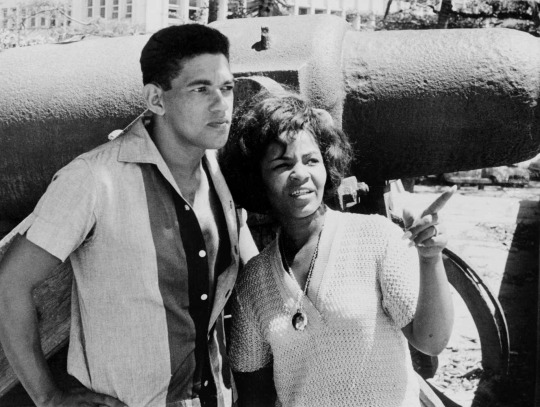
Ms. Soares and the soccer star known as Mané Garrincha in an undated photo. When he left his wife and eight children to marry Ms. Soares, it was a national scandal.Credit...Associated Press
It wasn’t until the early 2000s, long after the death of her husband, that Ms. Soares staged an unlikely comeback, embracing younger composers and producers who were just beginning to discover her music. Her new songs were even more direct than her earlier ones in addressing social issues, openly advocating for the rights of Black people, gay people, and especially women.
Elza Gomes da Conceição was born on June 23, 1930, in Rio de Janeiro’s Padre Miguel favela. Her mother, Rosária Maria da Conceição, was a washerwoman; her father, Avelino Gomes, was a bricklayer who played guitar and liked samba music.
Her father forced her to marry Lourdes Antônio Soares when she was 12; by the age of 21, she was a widow and the mother of five.
She said it was a desperate need to buy medicine for a sick child that led her to take a chance singing at a popular radio talent show when she was 15. She showed up in pigtails and a dress, borrowed from her mother, hemmed in with safety pins. She was nearly laughed offstage until the show’s host, Ary Barbosa, asked her what planet she had come from. She disarmed him with her reply: “The same planet as you — Planet Hunger.”
“At that moment everyone who was laughing sat down in their seats and everyone was quiet. I finished singing and he hugged me, saying, ‘Ladies and gentlemen, at this exact moment a star is born,’” Ms. Soares said in a 2002 television interview.
Her singing career took off, leading to appearances in movies and on TV. She was one of the few Black Brazilian women to rise to stardom at the time.
Her career, however, was soon overshadowed by her fiery love affair with Manuel Francisco dos Santos, known as Garrincha. Their romance began at the 1962 World Cup in Chile, where she was representing Brazil as an entertainer, and where her career might have taken a very different turn: She also met Louis Armstrong, who invited her to tour the United States with him, but she chose instead to follow her heart and return to Brazil with Garrincha. That move would have disastrous repercussions.
Harangued by the public and the press, the couple were forced to move to São Paulo and eventually to Italy, where they spent four years. They married in 1966.
Ms. Soares was pregnant with their son, Manoel Francisco dos Santos Júnior, when the couple returned to Brazil in 1975. By that time, Garrincha’s alcoholism was becoming a serious problem. He had been driving drunk in 1969 when he had an accident that killed Ms. Soares’s mother. He beat Ms. Soares, who became known for visiting bar owners to implore them not to serve her husband. But her efforts proved futile; Garrincha died of cirrhosis in 1983.
When their son died in a car accident in 1986 at age 9, Ms. Soares was devastated and left Brazil. She spent several years in Los Angeles, trying in vain to launch an international career.
She credited the Brazilian singer-songwriter Caetano Veloso with helping her return to music when she was ready to give up, by featuring her on his 1984 album, “Velo.”
But her output was spotty throughout the 1980s and ’90s, and it wasn’t until 2002 that she regained her stride, connecting with composers and producers from São Paulo’s samba sujo (“dirty samba”) scene to record the album “Do Cóccix Até o Pescoço” (“From the Tailbone to the Neck”), which was nominated for a Latin Grammy Award.
In 2016, her “A Mulher do Fim do Mundo” (“The Woman at the End of the World”) won a Latin Grammy for best Brazilian popular music album.
Ms. Soares is survived by her children, Joao Carlos, Gerson, Dilma and Sara, and by numerous grandchildren and great-grandchildren. Her son Dilson died in 2015.
She continued to find success with younger audiences in the new century, working tirelessly as she approached 90, exploring musical styles including electronic dance music, punk rock and free jazz, and recording albums that fearlessly addressed social issues.
The title of her album “Planeta Fome” (“Planet Hunger”), released in 2019, referred directly to how her career got its start on the radio talent show that would forever change not only her life but the course of Brazilian music.
1 note
·
View note
Text
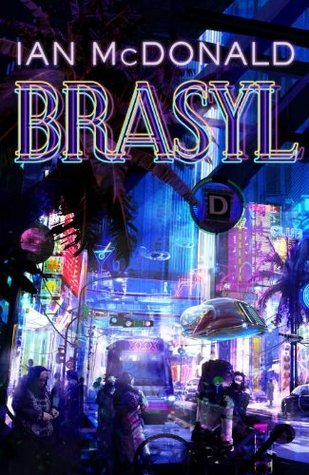
Brasyl, by Ian McDonald
So, now that I've outlined what I want from my speculative fiction, I need some examples. Is there anything out there that can meet my newly-high standards? Will I become some sort of cranky critic killjoy, categorically condemning everything as crap? Breathes there a book that exemplifies the principles of multiculturalism, new ideas, new ways of looking at the world, engaging plot, and artistic prose? Oh look, I have one right here. (How handy!) In fact it's a Hugo nominee this year. While I have my suspicions that Brasyl, by Ian McDonald, won't end up taking home the rocket, it should.
The story is told in three parts: past, present and future. In 1732, Father Quinn is a Jesuit priest who has come to Brazil to help deal with a rogue priest in the interior. In 2006, Marcelina is a reality TV producer who thinks she's come up with a sure-fire ratings hit. She'll find Barbosa, the goalie who didn't block the gaming-ending goal in a World Cup soccer match from the '50s, put him on TV mock-trial and see if Brazilians are willing to forgive him. As she tries to track him down some very odd things begin happening to her, as if a doppleganger is interfering with her life. Finally, in 2032, Edson is an entrepreneur working his way up out of the favela, the ghetto. When his brother steals a purse with a quantum-encrypted RFID system, he meets up with a quantumeira, an attractive rogue physicist hiring out her quantum computers for illicit purposes.
When all these threads intersect, and we finally find out what the ultimate conflict is, it is enlightening. It illuminates a much more fundamental question than simply "is all this real?" It picks an answer to that question, and then delves deeper into the implications. This is what really good sf should do.
It's interesting to compare Brasyl to its fellow Hugo nominee, Halting State by Charles Stross (about which more in a near-future post). Superficially, their near-future scenarios are similar. People have access to real-time heads-up computing in the form of web-connected glasses, and computing advances have led to quantum computing and largely ubiquitous surveillance that the characters must escape. Stross uses his story to make political points about personal and political struggles in such a world. McDonald gets deep into the structure of the universe and how we should move forward in a multiverse that may be just as strange as we can imagine. That difference in ambition is one of the many reasons why Brasyl is the superior work of the two (although as I'll make clear, I enjoyed Halting State perfectly well).
Another strength is that McDonald's characters are all interesting and completely different. Father Quinn is a powerful man who turned to the church because of his guilt over committing a murder. Marcelina has not signed up for an action-heroine life, but she will use all her resources to survive, even when the doppleganger ruins her already tenuous relationships with her mother and sisters. Edson is a man of many identities, refusing to be tied down to any one. Entrepreneur, young gay lover to an older man (who is also a physicist, helping with infodumping as needed), Efrim the empowered transvestite, Edson going after the beautiful lady physicist, DJ Pettycash the ruling DJ of the baile (street party - there's a very handy glossary in the back of the book), and many others. All of the main characters wrestle with multiple identities at different times, which reinforces the multiverse investigations of the plot and setting.
Each character/time line has a completely different tone and prose style. 2006 is written in the relatively straight-forward style that you find from most sf. The 18th century passages are written in a slower, more formal and poetic style. Edson's sections are exuberantly flamboyant. Consider this passage from the street dance:
Straight up Petty Cash catches PJ Suleiman's hip-swaying samba paulistano, hauls a mangue bass out of his sample array, and brings in a beat that has the bass drivers bowing and booming in their cabs. The crowd reels back all at once, whoa! Then in midbeat everyone is up in the air, coming down on the counterpoint, and the bloco is bouncing. Suleiman tries something clever clever with a classic black metal guitar solo and an old drum bass rinse, and it's itchy and scratchy but you can't dance to that. Petty Cash takes the guitar solo, rips off the bass section and bolts on funk in industrial quantities: an old gringo bass line from another century and a so-fresh-they-haven't-taken-the-plastic-off pan-rhythm. Efrim can see the track lines on Petty Cash's I-shades as his eyeballs sample and mix in real time. The audience are living it loving it slapping it sucking it: no question who wins this face-off.Throughout that whole scene I found myself nodding my head to the beat of the invisible music - that kind of response, pulling the reader in so completely, is the work of a master.
I enjoyed this work so much that I almost hate to point out any flaws, but all books have them. This one has fewer than most. Quinn's traveling companion is a (presumably) fictional French scientist, Robert Falcon. In this time line he's invented a primitive computer for weaving patterns via punch-cards. In our universe this was invented by Jacquard in 1804. Perhaps this feat of prodigy would explain why Falcon is already bandying about the concept of Turing's universal computer 300 years early, but it rang a false note for me. Just
because a concept is obvious to us now does not mean that it would be obvious to someone working with its antecedents. Another minor quibble is that Edson falls in love with one version of his quantumeira, then meets another one. For the ending to work one has to assume that his affections have transferred to the new woman (who isn't as cool as the 'original,' and McDonald doesn't quite sell the transition.
These points are really by-the-by. I haven't even started on the martial arts, the exotic cults, the honestly earned resonance with Heart of Darkness, the feeling that the people in the past and future really do think differently than we do, etc. It all comes together beautifully in a masterfully crafted package. I hope that via its Hugo nomination it gains a wide audience, many admirers and many imitators.
Posted by Karen Burnham at 12:37 Labels: excellent, McDonald, review, sf
2 comments:12 July, 2008 10:01
Anonymous said...Thanks for the great review! I don't usually comment --it's kind of bad taste, but I do have a little evidence to offer on the subject of looms. Jaen-Baptiste Falcon (who lived in Lyon) did indeed invent a prototype card-punch progammable loom in 1728: if your French is good, here's a wiki about him: http://fr.wikipedia.org/wiki/Jean-Baptiste_Falcon. His brother, however, is totally fictitious. His mission isn't, nor was the La Condamine expedition to which he refers, which can be read about it all it's glory and horror in the excellent 'The Mapmaker's Daughter' by Robert Whittaker. One of the joys of writing Brasyl was how much of it was pure documentary. Hope you don't mind me commenting: thanks again.
12 July, 2008 04:12 Karen Burnhamsaid...Ian - thanks for reading! I'm glad you liked the review - I certainly liked your book. Thanks for the background on Falcon. I felt like there was something there I was missing.
Those old scientific expeditions were really something, weren't they? Have you ever read The Worst Journey in the World? It's about Robert Scott's South Pole expedition. The author describes an incredibly perilous journey made to collect penguin eggs mid-winter. Then he publishes the entirety of the scientific article that made use of their hard-won artefacts. 1 page. It's hilarious and depressing at the same time.
0 notes
Text
Five Interesting Nonfiction Brazilian Novels
1.) “Brazil on the Rise” By: Larry Rohter
In this hugely praised narrative, New York Times reporter Larry Rohter takes the reader on a lively trip through Brazil's history, culture, and booming economy. Going beyond the popular stereotypes of samba, supermodels, and soccer, he shows us a stunning and varied landscape--from breathtaking tropical beaches to the lush and dangerous Amazon rainforest--and how a complex and vibrant people defy definition. He charts Brazil's amazing jump from a debtor nation to one of the world's fastest growing economies, unravels the myth of Brazil's sexually charged culture, and portrays in vivid color the underbelly of impoverished favelas. With Brazil leading the charge of the Latin American decade, this critically acclaimed history is the authoritative guide to understanding its meteoric rise.
2.) “Hippie” By: Paulo Coelho
Paulo Coelho, into remains the
primary source of inspiration for his books. He
has flirted with death, escaped madness, dallied with drugs, withstood torture, experimented
with magic and alchemy, studied philosophy and
religion, read voraciously, lost and recovered his
faith, and experienced the pain and pleasure of
love. In searching for his own place in the world,
he has discovered answers for the challenges
that everyone faces. He believes that within our-
selves we have the necessary strength to find
our own destiny. His books have been translated into 80 lan-
guages and have sold more than 225 million
copies in more than 170 countries. His 1988
novel, The Alchemist, has sold more than 65 mil-
lion copies and has been cited as an inspiration
by people as diverse as Malala Yousafzai and
Pharrell Williams. He is a member of the Drazilian Academy of
Letters and has received the Chevalier de l'Ordre
National de la Légion d'Honneur. In 2007, he was named a United Nations Messenger of Peace.
3.) “Dancing with the Devil in the City of God: Rio de Janeiro on the Brink” By: Juliana Barbassa
Juliana Barbassa moved a great deal throughout her life, but Rio was always home. After twenty-one years abroad, she returned to find the city that once ravaged by inflation, drug wars, corrupt leaders, and dying neighborhoods was now on the precipice of a major change.
Rio has always aspired to the pantheon of global capitals, and under the spotlight of the 2014 World Cup and the 2016 Olympic Games it seems that its moment has come. But in order to prepare itself for the world stage, Rio must vanquish the entrenched problems that Barbassa recalls from her childhood. Turning this beautiful but deeply flawed place into a predictable, pristine showcase of the best that Brazil has to offer in just a few years is a tall order—and with the whole world watching, the stakes couldn’t be higher.
With a cast of larger-than-life characters who are driving this fast-moving juggernaut or who risk getting caught in its gears, this kaleidoscopic portrait of Rio introduces the reader to the people who make up this city of extremes, revealing their aspirations and their grit, their violence, their hungers and their splendor, and shedding light on the future of this city they are building together.
4.) “Ways to Disappear” By: Idra Novey
Beatriz Yagoda was once one of Brazil's most celebrated authors. At the age of sixty, she is mostly forgotten-until one summer afternoon when she enters a park in Rio de Janeiro, climbs into an almond tree, and disappears.
When her devoted translator Emma hears the news in wintry Pittsburgh, she flies to the sticky heat of Rio. There she joins the author's son and daughter to solve the mystery of Yagoda's disappearance and satisfy the demands of the colorful characters left in her wake, including a loan shark with a debt to collect and the washed-up editor who launched Yagoda's career. What they discover is how much of her they never knew.
Exquisitely imagined and as profound as it is suspenseful, Ways to Disappear is at once a thrilling story of intrigue and a radiant novel of self-reckoning.
5.) “Soccer Star” By: Mina Javaherbin
Just in time for the World Cup, an inspiring story of a Brazilian boy who dreams of being a football star - and the sister who steps in to help his team win a game.When Paulo Marcelo Feliciano becomes a football star, crowds will cheer his famous name! Then his mother won't have to work long hours, and he won't have to work all day on a fishing boat. For now, Paulo takes care of his little sister Maria (she teaches him reading, he teaches her football moves) and walks her to school, stopping to give his team-mates cheese buns as they set out to shine people's shoes or perform for the tourist crowd. At the day's end, it's time to plan the game, where Givo will bounce, Carlos will kick - and Jose will fly! But when Jose falls on his wrist, will the team finally break the rules and let a girl show her stuff? Set in a country whose resilient football stars are often shaped by poverty, this uplifting tale of transcending the expected scores a big win for all.
0 notes